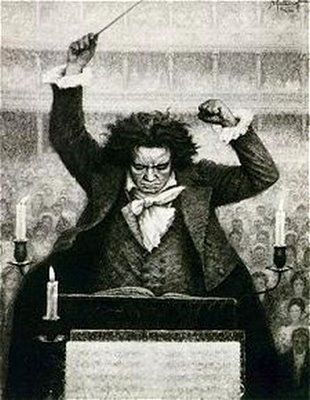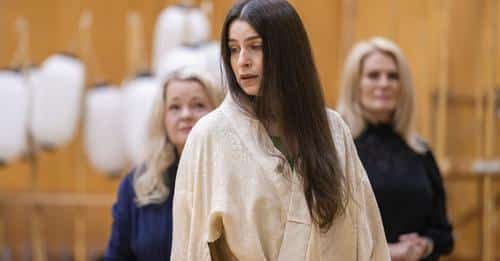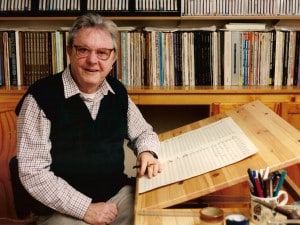This is not Beethoven’s opera, is it?
OperaOur Opera of the Week, coming from Bonn, takes its title from Beethoven’s overture and its plot from recent history.
Leonore 40/45 is an opera written by Rolf Liebermann, former artistic director of the Paris Opera. The opera belongs is written in 12-tone Schoenberg style but lightened by lyric interludes and ‘semiseria’ sending up. The 1952 premiere in neutral Basel was a success but the subject matter proved too sensitive for audiences in Germany in the 1950s for whom reconciliation evoked collaboration.
This October 2021 staging is part of Fokus ‘33, an ambitious programme by Theater Bonn to revive forgotten works from the first half of the 20th century. Liebermann was active in bringing opera nations together as the first President of FEDORA, the European Circle of Philanthropists of Opera and Ballet. He might have approved of OperaVision sharing this first staging of his opera for over 60 years with audiences online across the world. The opera is directed by Jürgen R. Weber and conducted by Daniel Johannes Mayr.
The Plot: Albert and Yvette fall in love in Paris but at a bad time. It’s 1941. He is an occupying German soldier and clarinettist. She is a young French-Czech pianist. When the post-war authorities declare ‘No marriage between enemies!’ who can help the young lovers? Enter Emile: part Emcee, part guardian angel. Yvette is sung by Barbara Senator and Albert by Santiago Sánchez.
Available from Friday 27 May at 1900 CET / 18.00 London/ 13.00 NY






interesting, very interesting, I certainly will watch, thanks.
About Liebermann:
https://basiaconfuoco.com/…/twenty-years-after-his…/
Lest we forget: Liebermann spent many brilliant years before and after Paris at the Oper Hamburg.
it’s all in my article
Why does Hitler look like Michael Palin?
Answering the rhetoric question in the title, it isn’t Beethoven’s opera, the composer just coasts on a name with a certain recognition value, so the crowd with the syndrome ‘I’ve heard the title somewhere, and if I’ve heard of it, it must be a known opera, ergo it must be good, let’s give it a try’. I predict we’ll see more of this phenomenon, with opera houses doing everything in their power to support the confusion. To be fair, the phenomenon isn’t new. To give just one example, there are more Armida than I care to count. What’s new is how the tactic is used – in the past, a new opera with the same name was composed, as a rule, only if the previous attempts had been a failure, or forgotten (there are exceptions.) Those composers weren’t coasting on anyone’s fame, just coasting on popular stories or tales. To modern audiences Beethoven’s opera is neither a failure, nor is it forgotten.
It seems unlikely that failure or oblivion alone explain the dozens of Artaserses (around 90 settings), Alessandro nell’Indies (70ish), Olimpiades (more than 60), or Didones abbandonatas (about 50) that flourished in the baroque and classical periods. Recognition and popularity, of course, but is that really such an abhorrent tactic? “I say, dear, there’s a new Ezio at the King’s Theatre (or the Teatro delle Dame, or the Hoftheater); shall we?” Then, too, it was bums on seats.
(Beethoven wasn’t first with Leonora, either; Gaveaux, Paër, and Mayr all got there slightly earlier).
Most of those you named fall under ‘coasting on popular stories or tales’ in my opinion (see end of my previous post.) Let’s not forget that during the Baroque period opera was still a very alive artform, with new operas being composed all the time. It was still going strong in the 19th century – Donizetti wrote about 70 operas before meeting his maker at barely 50 years of age. Theatre impresarios were used to think on the lines ‘We need a dozen or so new operas this season’, so invariably some popular stories got reused pretty often, or popular plays got made into operas – not much time for librettists to write something new. But these different operas sharing the same title and general plot line weren’t intended, as a rule, for the same public. News traveled slowly in the Baroque era, and people traveled even slower if at all – I should imagine long distance travel on bad roads in a poorly sprung carriage with no tires, no acclimatization, no heating system, wasn’t something wealthy people looked upon with great anticipation. I can well imagine that people who saw one Didone in the theatre, saw only that Didone and no other, or if they saw another production, it was only after a longish period of time.
‘is that really such an abhorrent tactic?’
It isn’t _abhorrent_ – it wasn’t back then nor is it now, but there is a difference in my opinion. Back then it was more coincidence than anything else, it certainly wasn’t done with the intention of confusing or even duping audiences – now it is.
The director seems to set the plot at the time and place indicated by the libretto. I thought this approach was passé.
It is passé only with works in public domain in which every graduate feels entitled to sink their fangs in. I doubt Liebermann’s opera is public domain. I should imagine the philistine approach looks a lot less attractive to the troubled & restless darlings when they know there might be a lawsuit in the offing.
Thank you for your interesting response.
Still, I wonder how the regietheater aficionados (how many are they really) will react to this production.